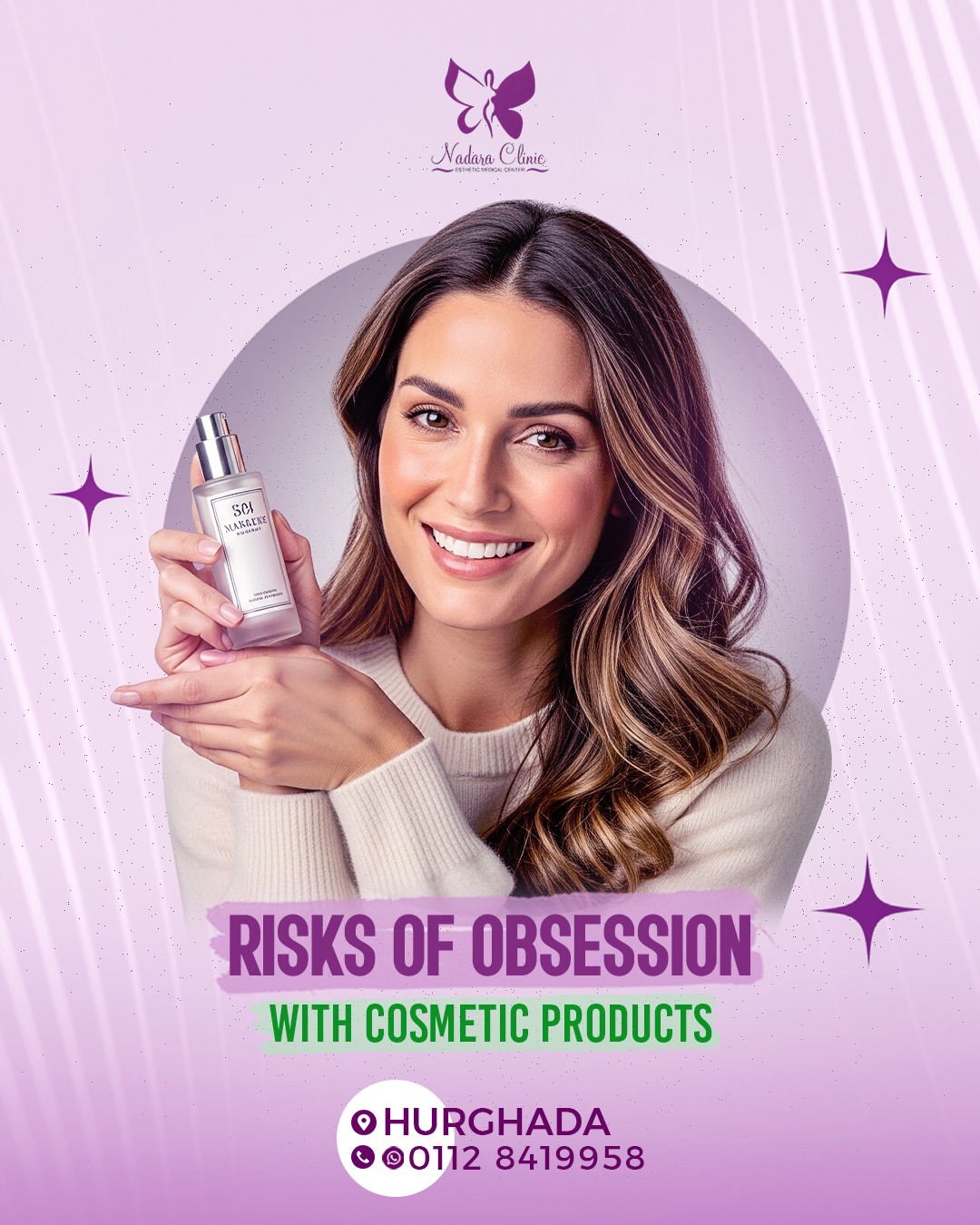Do you know the dangers of obsessing over beauty products? We appreciate that you, my dear, cannot do without makeup every day.
But using it in this way frequently can cause problems for your skin, as it contains a lot of chemicals, and ingredients that may not suit your skin.
Dermatologists at Nadara Skin, Cosmetic and Laser Center in Hurghada are always working to provide medical advice regarding your skin.
In this article, we will know the dangers of obsessing over beauty products, what are the right ways to apply them, and what types are appropriate for your skin type.
Does using beauty products every day harm your skin?
Many beauty products contain harsh chemicals that can harm your skin, making it easier for bacteria and other pathogens to enter your skin.
Regular use of makeup can cause side effects that affect the health and natural glow of the skin.
However, this does not mean that you cannot wear beauty products at all, unless you follow some healthy habits, and choose natural products that do not harm your skin.
The dangers of obsessing over beauty products
You should understand the risks of obsessing over the beauty products you use on your skin if you experience one or more of the following side effects:
- clogged pores
If you apply beauty products regularly and leave them on your skin for a long time, there is a possibility of clogging your pores.
This does not allow your skin to breathe, making it prone to acne, scarring, and other skin problems, and you may also notice bumps around your eyes.
- premature aging
Applying sunscreen is one of the most important things you keep in mind to protect your skin from the sun's harmful rays.
If you don't use it before applying makeup, you are exposing your skin to UV damage.
Leaving beauty products on the skin for a longer period, along with sun damage, can lead to early signs of aging that are:
- wrinkles;
- Fine lines on the face.
- Spots and pigmentation on the skin.
Make-up can also penetrate the pores of the face and break down elastin (fibers in the skin), if you do not remove it before bed.
- dry skin
If cosmetic products don't suit your skin type, they can make it drier or greasy.
- Acne and pimples
It may happen due to hormonal imbalance, some medications, and improper diet, but frequent use of makeup can increase the spread of pimples.
- allergic reaction
Some products look the same, but their ingredients differ from one brand to another. Beauty products made with mild, natural ingredients do not harm your skin.
However, other products that contain parabens can cause an allergic reaction if you are allergic to these substances.
This leads to skin redness, irritation, and itching.
- Skin color change
can affect Free roots Which is formed due to pollution, sunlight, and frequent use of makeup on the collagen of the skin, which weakens it and leads to a change in its color.
- eye infections
Dermatologists at the Freshness Skin Center in Hurghada recommend checking the ingredients of any cosmetic product before using it, as it may lead to eye inflammation and the appearance of dark circles.
Is skin cancer a risk of obsession with beauty products?
Skin cancer is one of the most common types of cancer in the world, yet there is not enough evidence to verify that it is caused by the excessive use of cosmetic products.
But products containing formaldehydeCoal tar, arsenic, silica, and lead cause cancer.
Therefore, you should check your cosmetic products very carefully, and make sure that they are free of these harmful substances.
Read also: Deep skin cleansing.
When should beauty products not be used?
It is not recommended to use cosmetic products during exercise, as they close the pores of the skin and prevent it from breathing.
It also cannot be used when it has expired in any way, as it will spread bacteria on your skin and cause skin infections.
You can also read : "How to take care of teenage skin?".
How to prevent the risks of obsession with beauty products?
There are tips that you should follow when using beauty products, recommended by dermatologists at the Freshness Center for Dermatology, Cosmetics and Laser in Hurghada, and they include the following:
- Buy the right product
You can't use a product just because someone else is using it, as everyone has a unique skin type.
Know your skin type, buy products that suit it and do not cause any allergic reaction.
Check the product label to see if you are allergic to any of the ingredients.
- Skin Moisturizing
Never underestimate the importance of moisturizer, regardless of your skin type. People with oily skin may think that moisturizing will make their skin oilier.
But using the right moisturizer will preserve it and rid you of skin problems such as dryness, redness, and cracking of the skin.
You can also read : Platelet rich plasma.
Tips after using beauty products
You can reduce the risk of obsession with beauty products by following some tips after using them, including the following:
- brush cleaning
Once you have finished applying makeup, you should clean your makeup brushes and sponges, and wash them at least once a week.
This procedure is important because it kills harmful bacteria from dead skin cells and sweat.
- Remove makeup before bed
This step is very necessary, as the skin renews itself during the night, and leaving makeup on it closes the pores and prevents them from breathing.
Use a makeup remover with soft cotton balls, then wash your face with a gentle face wash.
- Never share your beauty products
Sharing these products with others can spread bacteria and infection.
In the end, if your skin suffers from the risks of obsession with beauty products such as the appearance of acne, or signs of aging, you can visit the Freshness Center for Dermatology, Cosmetics and Laser in Hurghada.
The center has the latest equipment and technologies for treatment such as chemical peeling sessions, and you can also enjoy fresh, acne-free skin with deep skin cleansing sessions.
Specialized dermatologists determine your skin type and the appropriate treatment for your condition, and results will be visible within a few days after the sessions.






